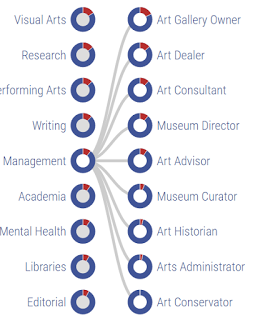
I want to share some thoughts, post-election, about diversity, inclusion and healing. But maybe not the thoughts you expect.
As I listen to museum colleagues talking about the election, I hear over and over again phrases like “I was living in a bubble,” “I wasn’t listening” “I didn’t know anybody who supported Donald Trump, so I was gobsmacked when he won.” Why the surprise? I suspect that in large part it’s because, as a field, we’re pretty homogeneous when it comes to politics.
Take a look at this interactive graphic by Verdant Labs that looks at occupations by political affiliation, identified by campaign contribution data from the Federal Election Commission. The occupations don’t map directly to museums writ large, but you can find some museum-specific data, under the Arts Management category:
- Museum Directors: 89 Democrats for every 11 Republicans
- Museum Curators: 94 Democrats for every 6 Republicans
- Art Conservators: 100% Democrats
 |
| Screen shot from Democratic vs.Republican Occupations, Verdant Labs |
Other occupations reflect fields that many museum staff come from, even if museum folk don’t constitute the majority of the larger field:
- Archaeologists: 94 Democrats for every 6 Republicans
- Historians: 88 Democrats for every 12 Republicans
- Scientists: 87 Democrats for every 13 Republicans
- Security Guards: 60 Democrats for every 40 Republicans
These data support my general impression, from years of working in and around museums, that our field leans largely liberal & Democratic. That being so, we don’t necessarily create a very friendly work environment for people who don’t share a liberal, Democratic world view. Look at the conversations taking place among museum folk on social media this week, or listen to the conversations in your own office. In the midst of what sounds like a universal outpouring of grief at the election of Donald Trump, how comfortable would a colleague feel admitting that he or she voted for him? Micro (or macro) aggressions can be directed at political views just as they are used to marginalize people for race, weight or gender.
If museums have a mandate for our staff to reflect our communities, shouldn’t that encompass political outlook as well? And if we don’t encompass political diversity, with all the perspectives about values, priorities and policy that go with that very important form of self-identification, doesn’t that leave us vulnerable to being out of step with a huge segment of the public we, as nonprofits, have pledged to serve?
Political affiliation isn’t the only personal attribute omitted from museums’ commitment to inclusion. Our field is often selective when it comes to embracing some kinds of religious diversity as well. We consider it right and appropriate for natural history museums, for example, to respect and acknowledge Native American creation narratives in exhibits otherwise devoted to scientific explanations of evolution. But one of the most frequent questions I received about Accreditation, when I ran the Excellence programs here at AAM, was “will AAM accredit the Creation Museum if they apply?” The questioners were uniformly horrified at the thought that we would validate a museum presenting a fundamentalist Christian world view.
Yesterday I listened to an episode of the podcast On The Media recorded the morning after the election, in which the hosts, Brooke Gladstone and Bob Garfield, talked through how they were feeling and about the future direction of the show during the Trump presidency. Brooke felt that the outcome of the election took them by surprise because they had not done a good enough job listening to people from outside their own echo chamber. She felt that the best response, over the next four years, was to invite a more politically diverse set of people into the recording booth, and to “pull back somewhat from commentary.” Bob, on the other hand, thought it was imperative to take a stand, to make people more aware of the insidious rise of demagoguery in politics, and of the immense harm this may do to our country. (They actually were kind of yelling at each other by the end of the episode.)
I think museums face the same choices, and with many of the same (unstated) consequences. Do we concentrate on being safe, neutral places for dialog, and work to bring in people with a conservative world view, just as we might work to bring in people of color or recent immigrants? Or do we double down on activism, fighting what we see to be the good fight but perhaps in ways that make people who believe in small government, self-reliance and personal responsibility feel even more strongly that we aren’t for them.
No one is saying museums ought to countenance hate, bigotry, or violence. But if we talk as if everyone who voted for “the other guy” is in favor of those things, we write off half the American public. The public we supposedly serve. And, not incidentally, the public that supports us with their tax dollars. Government funding for our institutions has been declining for 40 years—and that’s only counting direct support, not the significant subsidy provided via tax-exempt status. If museums, individually or collectively, act in ways that are perceived as partisan, we had better be ready to adopt new financial models sooner rather than later.
But really, the financial argument is only a proxy for the underlying issue: are we museum people willing to expand our commitment to diversity and inclusion to encompass people with whose beliefs and values may make us profoundly uncomfortable?

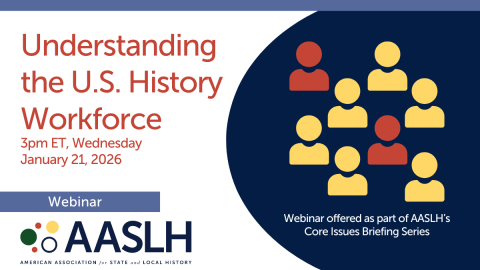


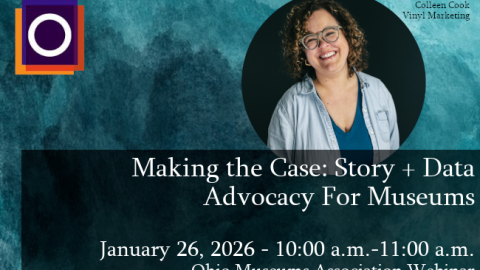
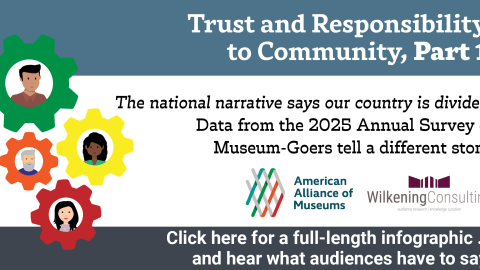

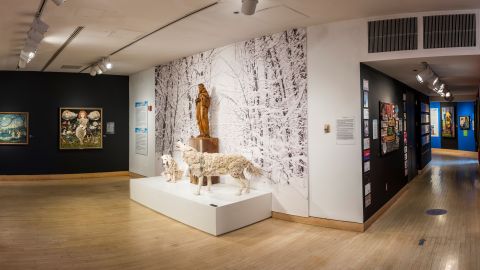

"We consider it right and appropriate for natural history museums, for example, to respect and acknowledge Native American creation narratives in exhibits otherwise devoted to scientific explanations of evolution. But one of the most frequent questions I received about Accreditation, when I ran the Excellence programs here at AAM, was 'will AAM accredit the Creation Museum if they apply?' The questioners were uniformly horrified at the thought that we would validate a museum presenting a fundamentalist Christian world view."
I consider this apples and oranges. I have never seen a natural history present Native American creation stories as scientific fact. In fact, the presentation of Native American objects (and those dioramas…) places Native American cultures in the context of BEING part of the natural world.
With the appointment yesterday of Stephen Bannon as Trump's chief advisor, it is crystal clear to me that Trump's agenda is one of white supremacy and misogyny. It is what he promised, and it is what people voted for. Best-case scenario is that they weren't thrilled with the whole white supremacy thing, but it wasn't a dealbreaker.
No. No, intelligent and kind and honorable museum people, you do not have to welcome that into your workplaces or make it part of the mission of your public institution to normalize it. I am not saying you should ostracize coworkers or divest yourself from donors…but I am saying that you are under no obligation to provide a space that is a comfortable one for such repugnant and exclusionary views. I am willing to bet that your mission tells you to do the opposite.
You have wonderful examples of the museum professionals in World War II who protected collections and saved lives, by offering refuge to those who were most vulnerable. These are the models we should be looking at now–resistance and personal and professional integrity, not fearful, mealymouthed capitulation.
Also this:
"But if we talk as if everyone who voted for “the other guy” is in favor of those things, we write off half the American public. The public we supposedly serve."
This was dangerously misleading. Trump voters represent one quarter of the electorate, not half of the American public. Does that seem like nitpicking or semantics? The difference is 25 million people compared to 160 million. Many of those 160 million–children, immigrants, the incarcerated–have no vote at all. Do you truly think it is equally important for us to create a safe space for a minority of hate mongers than it is to support and lift up the most vulnerable members of our communities?
Jessica, thank you for the important reminder to keep the museum's mission in mind.
Thank you for your comments, Laura and Jessica. Let's keep the conversation going–there is also a lively discussion over on Twitter (@futureofmuseums)
Thank you Jessica – my sentiments exactly
Museums cannot bemoan the lack of racial and ethnic diversity in our feild with one breath, and in another advise each other to be tolerant of the intolerant. A party focused on violence, misinformation, and bullying does not deserve a voice in representing culture.
"[I]f we talk as if everyone who voted for 'the other guy' is in favor of [hate, bigotry, or violence], we write off half the American public." Except half of the voting public rewarded a person who extolled and aligned himself with those things, and while they personally might or might not believe those things, they looked past them while giving him their vote. That's not okay, and that doesn't deserve any semblance of tolerance or respect. To do so is an insult to the fears, the voices, and the lives of people of color, LGBTQ people, and women. I'm deeply ashamed of AAM and the Center for the Future of Museums for this post.
As a museum patron, human rights activist and, yes, liberal, I would like to thank the AAM for this thought-provoking blog post. The rawness of the recent election (and the campaign which precipitated it), necessarily makes this a difficult topic to discuss, but that does not make the issues raised any less worthy of consideration. Whilst the "other side" may indeed be in the minority, they were able to leverage our political process to secure the Presidency, and that alone should give us pause to reflect on what happened, and what role museums can play in the aftermath. As someone who frequently has to engage with people who hold views vastly different than my own, I believe that museums do have a role to play in facilitating such dialogue. We may not respect or support the views of others, but we can all learn to discuss our disagreements in a manner that is firm but respectful. (If they choose not to reciprocate then so be it, but we can at least lead by example.) I have attended wonderful programmes at the Holocaust Museum where they did just that – panels of experts and doubters where the dialogue was vigorous, robust, and essential in providing all with an understanding of where each side was coming from and why. The museum facilitators certainly did not appear to be sacrificing their beliefs or countenancing bigotry – quite the opposite – and the museum exhibits stood as an inescapable testimony to their views. But all involved came away with a deeper understanding of the issues at hand, and in some cases a shift in thinking that was helpfully transformative for all concerned. Our nation needs to heal, and museums have a crucial role to play in providing opportunities for respectful dialogue, and in the provision of information that can help to expand people's knowledge and understanding. How best that can happen seems to me a worthy topic for consideration.
Please read:
http://www.tabletmag.com/jewish-news-and-politics/217831/what-to-do-about-trump
"Friends and pundits will reach out to you and, invoking nuance, urge you to admit that there’s really nothing to fear, that things are more complex, that nothing is ever black or white. It’s a perfectly sound argument, of course, but it’s also dead wrong: This isn’t about policy or appointments or even about outcomes. This isn’t a political contest—it’s a moral crisis. . . . There’s no point indulging in the kind of needlessly complex thinking that so often plagues the intelligent and the well-informed. There’s no room for reading tea leaves, for calculations or projections or clever takes. The only thing that matters now is the simple moral truth: This isn’t right."
–Liel Leibovitz
I am posting this comment, with permission, on behalf of a reader who contacted me via email. Thank you all for the robust discussion of this post. –Elizabeth
I am a current graduate student in an Art History and Museum Studies program. I found the Center for the Future of Museums blog today, and I read today's post entitled "Healing the Partisan Divide." I just wanted to ensure that this feedback reaches the author of that blog post: I was so happy reading this post, and could not believe that I happened to stumble upon it. Earlier today, I had written my own musings on this subject, just for me, as a cathartic experience to what I have been feeling and facing this past week since the election. I am an independent voter who tends to lean conservative, and working in the art world I often find that my views are different than those of my colleagues and friends. What I am witnessing now however is an overwhelming assumption that I have propped up racism and bigotry, that I represent hatred. Never have I felt as afraid of my peers and mentors knowing who I voted for, because I see that they have no interest in discussing the matter. I absolutely agree that museums should provide a space for civil discourse and exchange of ideas. As the author so aptly put it, "Micro (or macro) aggressions can be directed at political views just as they are used to marginalize people for race, weight or gender."
I absolutely stand against close-mindedness, racism, misogyny, and injustice. Any feeling human would. Unfortunately my peers and mentors seem not to want to extend this benefit of the doubt to me. Reading this post today was an unexpected pleasure, and I thank the person who wrote it, whatever their political views, for offering a literary hand of friendship and truly trying to put an end to the divisive discourse that is prevailing in our country today. I only hope that people of all views can come together and discuss these issues in constructive ways that do not privilege or tear down any one perspective without first examining the argument presented.
–Ashley
There is a major disconnect here. A vote for Trump and a general leaning toward traditional conservative values are very different things. In your original blog post, you seem to equate the two, which is problematic, and I am surprised is not more offensive to the person that you quoted above.
Good and intelligent people can accept that there are differing views about economic policy, foreign policy, and other issues. What most of us–and by that I mean the FAR more than half of America that did NOT vote for Trump–cannot accept is a white nationalist platform rooted in racism, antisemitism, fear of outsiders, and the subjugation of women. It is deeply objectionable to suggest that those who support such a platform are deserving of protected minority status. I stand by that.
I would love to hear some voices of color on this thread.
Thank you for your comments, Jessica. I am troubled that you read the original post as conflating conservatism with support for Donald Trump. Quite the opposite. When I wrote "we talk as if everyone who voted for “the other guy” is in favor of those things," I meant to emphasize the opposite.
What your words suggest is that some who support Trump are somehow not supporting a white nationalist agenda, and I reject that. There are certainly plenty of ardent conservatives who continue to support traditional Republican values, values that are worthy of respect and consideration. They are the ones who did not vote for Trump.
Thank you for this extremely important post. I think it raises some fundamental issues for our profession that we've been ignoring for too long and which AAM has a responsibility to address. It's unfortunate that we weren't having these discussions before the current election cycle began; sadly, I think that reflects our own hubris, in that we had already decided that we knew what the problems of social exclusion were and were dealing with them.
It's the nature of democracy that we don't get to impose our views on others, however certain we are that we're right; we have to bring people along with us. If we don't, then inevitably there is a backlash. Museums have a critical role as safe spaces for difficult conversations, but those conversations are meaningless if we start excluding categories of people, particularly if we we're ascribing motivations and beliefs to them to without taking the time to talk to them first.
I am finding that there are too many people talking over each other and not enough listening going on. There are truth and falsehoods coming from both sides. Unless we can listen to each other and sort out what is true and what is false there will be this continual war of words that will eventually lead to more death and destruction. God will only save America if Americans will listen to his words starting with the ten commandments.
I can't quite believe where this conversation has gone. My point, in a nutshell, is that conservatism is one thing, but white nationalism is another, and that there is no place in a public American museum for a white nationalism agenda. How is it possible that the Center for the Future of Museums and AAM disagree with that?
I won't be commenting on this thread anymore. I urge you to continue the conversation within the organization and within your own consciences.
Posted on behalf of a reader, comment submitted via email:
"Jessica, your comments paint with a broad brush, and your last statement in particular is quite offensive.
I’m wondering if Jessica, and those at other institutions who share her opinions, will be declining money offered to their museum by donors, board members, and visitors based on their political affiliation? If you do not support a free-thought environment for staff, why should it be extended only to people who give you money? Museums risk losing some very talented human assets if they persist with and or amplify this approach.
Contrary to Jessica's last post, I am not supporting a white nationalist agenda and I did vote for President-Elect Donald Trump. I have not been President Barack Obama’s biggest fan over the last eight years, but I respect those who elected him even though I deeply disagreed with their votes. The presidential election is not just about support for that candidate; it is about changing the landscape in the Supreme Court, in Congress, and in our relationships with other countries, just to name a few critical areas. A change every four or eight years is good and important in a representative democracy.
I have been a right-leaning voter for 36 years. It has made for some spirited but kind debates among friends, family, loved ones, and strangers. It is a chance to learn and to be heard. That environment has changed dramatically over the last several years.
I was very excited to begin work at a museum. I imagined a peaceful and creative place with the overarching spirit of freedom of thought and emotion toward different works of art that would extend to other aspects of life and community. Very soon after starting work at the museum, I learned I needed to keep my more conservative opinions to myself, while the alternate view was free-flowing. (The statistics in your blog explained quite a lot!) Others who share my views cautiously signal to each other much like early Christians, Jewish Sympathizers, and now many homosexuals, just to name a few of the groups who have not enjoyed freedom of speech and identity. Those are extreme and exaggerated comparisons, as we are not in danger in any way, but we are trying to avoid unnecessary conflict and shaming, and escalation of emotions. This climate does not invite discussion or mind-changing or peace.
Thank you for this very thoughtful blog. It gives me hope that perhaps I can come out of hiding, resume thoughtful and respectful discussions, and that some barriers built among my coworkers will be eliminated. My wish is that we can return to a dialog that is about issues, and not personal attacks, including attacks on very good people who think differently."
With respect to Jessica, there is nothing in this blog post or the subsequent commentary to support the idea that AAM or the CFM want to make space in public museums for advancing a "white nationalism agenda." That viewpoint labels 62 million Americans as white nationalists whose views should never be listened to. And it is not a position that any museum should be adopting, least of all now.
I am sure that some people voted for Trump and they are not in favor of a white nationalist agenda. I work at a museum in a very conservative Arizona town. Most people are Republicans. About half the staff is made up of Democrats. We have to be careful about speaking about politics and we ask that volunteers do not talk about their political leanings with our visitors. I think this is a very interesting blog. We need to learn how to communicate with everyone, and over-generalizing about people's motives when they voted for Trump will not help. I am very discouraged, sad and afraid due to his election, but know that there are some decent people who voted for him for reasons that don't make sense to me. However, they're not all racists.
I also struggle with the consequences of a vote for Trump. The rhetoric of the campaign rejects values that I hold dear, and the appointments being made, etc… may result in social harm to vulnerable groups. These are legitimate worries.
Yet, the question posed by the blog post is how museums engage/involve those persons who do not completely align with liberal and/or progressive beliefs. The post does not suggest that those beliefs be surrendered, it merely suggests reevaluating our own biases and trying to be open to other opinions. There is clearly a significant segment of the population that feels ignored by academia, mainstream media, and the progressive movement. To take a quote from the disability movement, this group has voted and said, "Nothing about us without us."
This election has made me start reevaluating some of my own assumptions and biases about post-industrialized America. As a museum patron, there are some questions that I would like to understand and that museums can help address. For example, what effect has several decades of globalization and technological advances, had on jobs and the ability of people to make a decent living? Seems that the service/retail sector does not fill this gap. What happens when social change moves faster than what some people are ready for? We see these conflicts in many places in the world. Museums can shed light on these questions by looking at the present and analogous situations in history.
Some comments seem to imply that addressing the concerns raised in the blog post require a sacrifice or abandonment of a set of values. That any change leads to a slippery slope. Yet, many on both sides seem to fear the slope, even if the grade is not that steep. We need to step out on the slope and take a risk. That's what engaging in different points of view is all about. After all, we aren't talking about curating an exhibit to promote creationism. We are talking about addressing different points of view in a properly curated exhibit. The other option, soldiering on, may be appropriate in some circumstances. It's a judgment call. However, the country deserves a robust conversation. Museums, by incorporating different ideas, and allowing staff with different viewpoints to express them, can help move the conversation forward.
Efforts toward “inclusion, diversity, healing” would be better offered to those who, for whatever reason, did not vote in this election – the majority of which are registered Democrats.
My family is Republican; I have, on occasion, voted Republican; I worked in a county art museum for 15 years controlled by Republicans. Conservative Republicans would scoff at “Inclusion, diversity, healing.” They won, and I do not believe, as winners, that they wish to be “reached-out” to by anyone.
Conservative Republicans have for decades maintained a position of distain relative to museums that has hardened into a near condemnation of what we do. These people, in my experience, would only mock and dismiss any attempt at “Kumbaya.” They simply don’t wish to be associated with what they perceive as a profession filled with decadent, effete intellectuals and bleeding heart liberals.
There are historic instances, and instances occurring in the present, that demonstrate that extreme conservatism – whether religious or political – consistently looks to oppose, undermine, steal, and destroy what we are committed to safeguarding.
What I’m saying is – it’s not that Trump voters can’t understand or appreciate museums, it’s that they choose not to! Why waste our time. It would be much more effective for professionals from all types of museums to stand together and defend each other from any form of attack.
Thank you for this powerful and thought-provoking post, Elizabeth.
A few thoughts:
1) I don't think the times favor the creation of neutral spaces. As we can see from the comments here, American culture is now deeply split, and people prefer to align with their parties rather than engage in dialog with others.
As Jessica Routhlier comments, "intelligent and kind and honorable museum people… you are under no obligation to provide a space that is a comfortable one for such repugnant and exclusionary views."
2) Most of the liberal/Democratic discussion has turned on issues of gender and race. I'd like to add economic class to that powerful mix, and wonder to what extent today's museums are prepared to reach out to workers and/or poor people left behind by our increasingly unequal economy.
Johnny K touched on this in his comment.
3) Jessica and retired museum professional point out an underappreciated fact, namely that voting turnout was embarrassingly low this year. How can museums a) reach out to those who chose not to engage, and b) maybe boost civic participation among that group?
Thanks for all your work on this Jessica Routhier. As you pointed out, voters for Trump endorsed for US President a man who endorses white supremacy and other hateful beliefs through his actions (look at his cabinet choices, look at the evidence of his well-documented acts ("Grab 'em by the pussy!"), look at his Tweets. He has been endorsed by the KKK, for goodness sake! So when reading this CFM/Merritt statement, which somehow manages to overlook all the specificity of the man and what a vote for him stands for — "In the midst of what sounds like a universal outpouring of grief at the election of Donald Trump, how comfortable would a colleague feel admitting that he or she voted for him?" — I wonder why anyone of conscience would worry more about the feelings of those who endorse hate and harm, than those who are hated and harmed? Why should musuems center and support supporters of bigotry? In fact, based on recent news, museum workers might do better right now to focus on how they will care for their many patrons and co-workers who have recently been assaulted, subjected to hate-graffitti on museum labels, been insulted by visitors during tours, and experienced other traumatizing events unleashed by this election: http://www.reuters.com/article/us-usa-immigration-museum-idUSKBN13G2BI